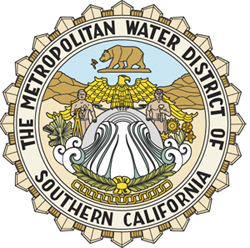Emergency Pipeline Repair Requires 4 Million People Across LA County to Suspend Outdoor Watering for 15 Days, Sept. 6-20
Emergency Pipeline Repair Requires 4 Million People Across LA County to Suspend Outdoor Watering for 15 Days, Sept. 6-20
Important water delivery pipeline must be repaired to ensure water reliability for region
LOS ANGELES--(BUSINESS WIRE)--Residents and businesses in dozens of communities across Los Angeles County were urged today to eliminate all outdoor watering for 15 days starting next Tuesday (Sept. 6), while a critical water delivery pipeline is shut down for emergency repairs.
The Metropolitan Water District of Southern California joined officials from Burbank, one of the affected cities, in making the water-saving call as the district prepares to shut down its Upper Feeder pipeline Sept. 6-20 to repair a leak.
The leak in the pipeline, which helps deliver Colorado River water to Southern California, was first discovered in April and a temporary fix was immediately put into place, allowing Metropolitan the time required to fabricate specialized parts for a longer-term fix. Those parts have been built and crews are ready to work around the clock to install them.
“The temporary fix we have in place has allowed us to operate the pipeline at a reduced capacity over the summer, but it is not intended to last long-term,” Metropolitan General Manager Adel Hagekhalil said during the event at Burbank Water and Power’s Ron E. Davis Eco Campus. “We cannot delay this repair any further – doing so risks a failure and the potential for an unplanned, emergency situation.”
Along with Burbank, other Metropolitan member agencies under this urgent call are the cities of Beverly Hills, Burbank, Glendale, Long Beach, Pasadena, San Fernando, and Torrance, as well as Central Basin Municipal Water District, Foothill Municipal Water District, Three Valleys Municipal Water District and West Basin Municipal Water District. See attached map.
Residents and businesses in these communities are called on to temporarily suspend all outdoor watering, including drip irrigation and hand-watering. Metropolitan recommends trees and gardens be pre-watered before the shutdown and maintained using water collected from the sink and shower. Additional water-saving tips in preparation for and during the shutdown are available at mwdh2o.com/shutdown.
“During this shutdown, we’ll be tapping into a very limited supply of water to deliver to these communities. So we must eliminate all outdoor water use and do everything else we can to conserve for 15 days,” Metropolitan board Chairwoman Gloria D. Gray said. “We want to thank residents and businesses in advance for their support and recognizing the water-supply challenges our region faces.”
Director Marcia Ramos, Burbank’s representative on Metropolitan’s 37-member board, joined Gray in recognizing the water-saving challenge during the shutdown.
“I am very proud of our community – we are demonstrating that we can be resilient and make small sacrifices for the good of all of the region. We are an interconnected water system and it’s important that we’re able to rely on and support each other,” Ramos said.
Dawn Roth Lindell, General Manager of Burbank Water and Power, shared how their city is supporting the community during the shutdown by providing residential customers access to recycled water via their H2O to Go program.
“Residents can access recycled water for trees and plants at George Izay Park 10 a.m. to 7 p.m. Monday through Saturday and 12 p.m. to 5 p.m. on Sundays during the two-week shutdown,” Lindell said.
Residents and businesses who want to know more about how the shutdown will affect them should contact their water provider or email communityrelations@mwdh2o.com. Consumers under emergency conservation since June 1 will maintain the existing watering restrictions from their local agencies.
Note to media: Photos and b-roll of the Upper Feeder pipeline are available here. Media is encouraged to use these resources, as the site will not be accessible to the public/media due to security concerns.
The Metropolitan Water District of Southern California is a state-established cooperative that, along with its 26 cities and retail suppliers, provides water for 19 million people in six counties. The district imports water from the Colorado River and Northern California to supplement local supplies, and helps its members to develop increased water conservation, recycling, storage and other resource-management programs.
Contacts
Rebecca Kimitch
(213) 217-6450
(202) 821-5253, mobile
rkimitch@mwdh2o.com
Maritza Fairfield
(213) 217-6853
(909) 816-7722, mobile
mfairfield@mwdh2o.com
